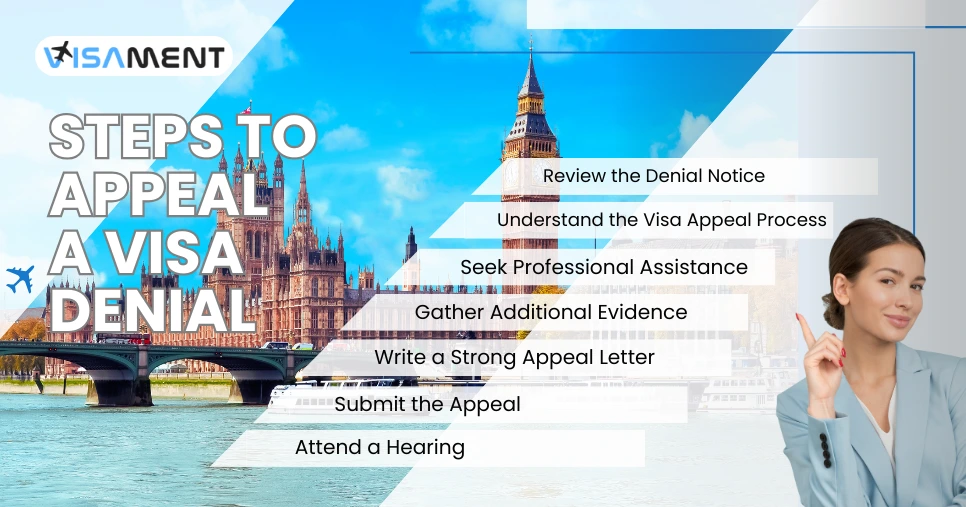Getting a visa denial is a frustrating and heartbreaking experience. It mostly happens when your travel plans are fixed. Still, many countries offer to appeal a visa denial, giving applicants a second chance to present their case. In this blog, we will talk about the steps to effectively appeal a visa denial. We will also share some tips and detailed advice. So let’s start with the reasons for visa denial, and later we will shed light on how to appeal a visa denial.
Before filling out the visa application form, it’s important to understand why your visa application was denied. Here are some of the common reasons behind the rejection of visa applications.
Incomplete Document for Visa
Missing or incorrect documentation is one of the most common reasons for visa denials. Review your application carefully to identify any gaps.
Unable to Fulfill Financial Requirements
Several countries need proof of sufficient income or funds to cover your stay. If this proof is insufficient or unclear, your application may be rejected.
Few Connections to Home Country
Visa authorities examine applicants' close ties to their native country to ensure they will return after their vacation.
Past Immigration Violations
Immigration violations like overstays, deportations, or violations of immigration laws are one of the main reasons behind visa denial.
Errors in the Visa Application Form
Mistakes or inconsistencies in the visa application or supporting documents can raise red flags to the process.
Security Concerns
Any suspected danger to national security or public safety might give rise to a visa refusal.
The visa denial notification includes the exact details behind the visa denial. So it is necessary to read the notification carefully.
There are various types of visas but not all visa denials are eligible for appeal. Some countries allow visa appeals, and some may require you to reapply. Here's how it works in different scenarios:
We offer OCI, Visa, and Passport application services along with other services. Our team will make sure to get your dreams fulfilled by filling out an error-free application for you.
Contact US
Countries Allowing Appeals:
The United States, the United Kingdom, and certain European countries under the Schengen Agreement provide an appeal process for visa denials.
Countries Requiring Reapplication:
Countries like Canada and Australia often suggest reapplying rather than appealing, especially for temporary visas.
Check the rules and guidelines of the specific country’s immigration authority to determine your options.

Review the Denial Notice
Start by thoroughly reading the denial notice issued by the visa officer. This document outlines:
The reasons for the denial.
Your rights to appeal (if applicable).
The timeline for submitting an appeal.
Understand the Visa Appeal Process
Research the specific visa appeal process for the country in question. Some countries require written submissions, while others may involve a formal hearing.
Appeals often have strict deadlines. For example, Schengen visa appeals must usually be filed within 30 days.
Some countries provide specific forms to be filled out for the appeal process.
Seek Professional Assistance
Consider hiring an immigration lawyer or consultant to strengthen your appeal. They can help:
Gather Additional Evidence
Address the reasons for denial by providing additional documentation, such as:
Proof of financial stability (bank statements, sponsorship letters).
Strong ties to your home country (property documents, employment letters).
Corrected or clarified application details.
Write a Strong Appeal Letter
The appeal letter is a critical component of the process. It should:
Be professional and concise.
Address the specific reasons for the denial.
Include additional evidence to support your case.
Sample Structure of an Appeal Letter:
Submit the Appeal
Ensure your appeal is submitted within the specified timeframe and to the correct authority. Double-check that all required documents are included.
Attend a Hearing (If Applicable)
In some cases, you may be required to attend a hearing. Prepare thoroughly by:
Reviewing your application and appeal letter.
Practicing responses to potential questions.
Dressing professionally and arriving on time.
Acknowledgment of Appeal
After submitting your appeal, you should receive an acknowledgment from the relevant authority.
Processing Time
Appeal processing times vary by country and case complexity. It can take weeks to months to receive a decision.
Outcome
The decision may result in:
Approval of your visa.
Upholding the denial.
Recommendation to reapply with modifications.
If the appeal is unsuccessful, carefully review the outcome and consider alternative options, such as reapplying or exploring other visa categories.
Stay Calm and Professional
Avoid expressing anger or frustration in your appeal letter or during hearings. Maintain a respectful tone.
Be Honest
Provide accurate and truthful information. Any discrepancies can harm your credibility.
Focus on Addressing Denial Reasons
Tailor your appeal to directly address the reasons for the denial, supported by strong evidence.
Organize Your Documentation
Submit all required documents in a well-organized manner to make it easier for the reviewing officer to evaluate your case.
Follow Up If Necessary
If there are delays in the appeal process, consider following up politely to check the status of your case.
Missing Appeal Deadlines
Failing to file your appeal within the stipulated timeframe will render it invalid.
Reapplying Instead of Appealing
Understand whether reapplication is the correct course of action for your situation.
Submitting Incomplete Information
Ensure all documentation is complete and relevant to avoid further complications.
Neglecting Professional Help
If the case is complex, professional assistance can make a significant difference.
If you are getting a visa denial from the administrative appeals office, then it is a worthy post for you. Going through this blog, you will learn about how to appeal a visa denial. Alongside this, we also mention the reasons that lead visas to rejection.
So if you are also facing visa denial issues, then we suggest you hire an immigration service provider. It is because they know how to deal with visa rejections. We suggest you choose Visament. It is one of the best immigration service providers and always offers all visa-related services.
Yes, you can apply for another visa after your application is refused.
It depends on the country and the type of visa, but in most cases, you can reapply for a visa after it's been refused.
After being denied a US visa, you are legally allowed to reapply as many times as you choose.
No, after your visa application gets rejected, you often cannot get your money back. This is so because the charge pays for the processing expenses and administrative labor involved in evaluating the application.
When you visit a website, it may store data about you using cookies and similar technologies. Cookies can be important for the basic operations of the website and for other purposes. You get the option of deactivating certain types of cookies, even so, doing that may affect your experience on the website.
It is required to permit the basic functionality of the website. You may not disable necessary cookies.
Used to provide advertising that matches you and your interests. May also be used to restrict the number of times you see an advertisement and estimate the effectiveness of an advertising campaign. The advertising networks place them after obtaining the operator’s permission.
Permits the website to recognize the choices you make (like your username, language, or the region you are in). Also provides more personalized and enhanced features. For instance, a website may inform you about the local weather reports or traffic news by storing the data about your location.
Aid the website operator to determine how the website performs, how visitors interact with the site, and whether there are any technical issues.